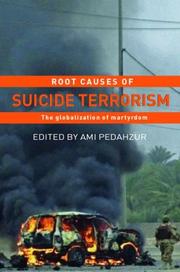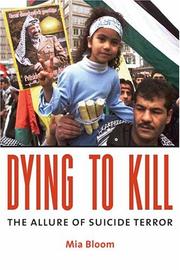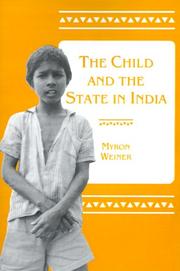| Listing 1 - 8 of 8 |
Sort by
|
Book
ISBN: 2080800841 9782080800848 Year: 2003 Volume: 544 Publisher: Paris : Flammarion,
Abstract | Keywords | Export | Availability | Bookmark
 Loading...
Loading...Choose an application
- Reference Manager
- EndNote
- RefWorks (Direct export to RefWorks)
Martyrdom --- Terrorism --- Suicide bombers. --- Violence --- Martyre --- Terrorisme --- Kamikazes (Attentats-suicides). --- Islam --- Religious aspects --- Islam. --- Aspect religieux --- Politico-religious --- Jihad

ISBN: 0415770297 0415770300 9780415770293 9780415770309 9780203964910 9781135987329 9781135987367 9781135987374 Year: 2006 Publisher: New York : Routledge,
Abstract | Keywords | Export | Availability | Bookmark
 Loading...
Loading...Choose an application
- Reference Manager
- EndNote
- RefWorks (Direct export to RefWorks)
Suicide terrorism in its modern form appeared in the 1980s. The first organization to use this strategy was the Shi'ite Hizbollah in Lebanon. Later, it was adopted by many terrorist organizations in the Middle East and Asia. This new study shows how there are at least two reasons to question the central role that is assigned to religion and more specifically Islam when explaining suicide terrorism. First, suicide terrorism is a modern phenomenon, yet Islam is a very old religion. Except for two periods in the 12th and 18th centuries, suicide was never part of Islamist beliefs and behaviors. Actually, Islam clearly forbids suicide. Hence, the argument that Islamic religious beliefs are the main cause of suicide terrorism is inherently dubious. Second, many suicide attacks have been carried out by secular organizations with little connection to fundamentalist Islam: Palestinian Fatah, the Popular Front for the Liberation of Palestine, the Kurdish Workers Party. Moreover, one of the organizations that has employed this strategy devastatingly and regularly is the LTTE (Liberation Tigers of Tamil Elam). Not only are members of this organization not Muslim, most of them are not religious at all. This superb book contains essays by some of the world's leading scholars of terrorism and political violence. It is essential reading for students of terrorism, political science and Middle Eastern politics, and useful to students of social psychology, theology and history.
Suicide bombings --- Suicide bombers --- Terrorism --- Attentats-suicides --- Kamikazes (Attentats-suicides) --- Terrorisme --- Psychology. --- Religious aspects --- Islam. --- Psychologie --- Aspect religieux --- Islam --- Suicide bombings. --- Terrorism.
Book
ISBN: 9780367457617 9781032104232 9781003026303 Year: 2022 Volume: v. 28 Publisher: New York, NY : Routledge,
Abstract | Keywords | Export | Availability | Bookmark
 Loading...
Loading...Choose an application
- Reference Manager
- EndNote
- RefWorks (Direct export to RefWorks)
"Theories of Terrorism explains and advances the major theories of terrorism that address issues of becoming a terrorist, being a terrorist, and leaving terrorism, in a clear and accessible format for use by students and academics seeking to advance theoretically driven research in the area. Readers will gain an understanding of the most promising explanations of terrorism that have been developed to date and how they can be used to explore core substantive issues related to the topic. The content is delivered with a scholarly depth, though still accessible by students at different levels. The book offer explains for the three phases of radicalization, covering emerging topics such as women's involvement in terrorism, fear of terrorism, the code of the terrorist, and suicide terrorism. This is the first book in the Advances in Criminological Theory Series to address the issue of terrorism and emphasizes the use of theory for future research development. The style and content coverage of the book make it appropriate as a supplemental text in undergraduate courses on terrorism and political violence. The inclusion of current empirical literature and guidance for future research efforts gives the text appeal for graduate students and academics in the disciplines of criminology/criminal justice, political science, sociology, and interdisciplinary terrorism studies. The emphasis on theory and the radicalization process throughout the text will also make the book useful as a reference for general graduate-level theory courses within these areas"--
Terrorism --- Bombers (Terrorists) --- Criminology. --- Terrorists --- Terrorisme --- Terroristes. --- Criminologie --- Kamikazes (attentats-suicides) --- Research. --- Psychology. --- Psychology --- Recherche. --- Psychologie --- Criminology --- Research --- TERRORISM--RESEARCH --- BOMBERS --- CRIMINOLOGY --- Bombers (Terrorists).

ISBN: 9781601270047 1601270046 Year: 2007 Publisher: Washington, D.C. United States institute of peace
Abstract | Keywords | Export | Availability | Bookmark
 Loading...
Loading...Choose an application
- Reference Manager
- EndNote
- RefWorks (Direct export to RefWorks)
"This book: draws extensively on open-source intelligence and papers of record, primary sources from insurgent groups, including online documents and videos, and interviews with U.S. service members who have served in Iraq; examines the history of suicide bombing in Iraq and many other countries, theoretical perspectives on suicide bombing, and the varies factions that compromise the insurgency; and explores the ideology and theology of martyrdom supporting suicide bombers, their national origins and characteristics, and the prospects for a "third generation" of transnational jihadists forged in the crucible of Iraq."--BOOK JACKET.
Islam --- terrorisme --- Polemology --- Iraq --- Suicide bombers --- Suicide bombings --- Terrorism --- Insurgency --- Martyrdom --- Kamikazes (Attentats-suicides) --- Attentats-suicides --- Terrorisme --- Révoltes --- Martyre --- Islam. --- 855.5 Gewapende groeperingen --- 854 Terrorisme --- 855.1 Strategie --- Révoltes --- Bombings --- Suicide --- Bombers (Terrorists) --- Martyrdom (Islam) --- Muslim martyrs

ISBN: 2080684213 9782080684219 Year: 2002 Publisher: Paris : Flammarion,
Abstract | Keywords | Export | Availability | Bookmark
 Loading...
Loading...Choose an application
- Reference Manager
- EndNote
- RefWorks (Direct export to RefWorks)
Women, Palestinian Arab --- Suicide bombers --- Femmes arabes palestiniennes --- Kamikazes (Attentats-suicides) --- Women suicide bombers --- Arab-Israeli conflict, 1993 --- -Women, Palestinian Arab --- Suicide bombings --- Political philosophy. Social philosophy --- Criminology. Victimology --- Politics --- National movements --- Palestine --- Women suicide bombers - Gaza Strip --- Women suicide bombers - West Bank --- Women suicide bombers - Israel --- -Women, Palestinian Arab - Gaza Strip --- Women, Palestinian Arab - West Bank --- Suicide bombings - Gaza Strip --- Suicide bombings - West Bank --- Suicide bombings - Israel --- Terrorism --- Protest movement --- Liberation movements --- Biography --- Book

ISBN: 0231133200 0231509863 9780231509862 Year: 2005 Publisher: New York Columbia University Press
Abstract | Keywords | Export | Availability | Bookmark
 Loading...
Loading...Choose an application
- Reference Manager
- EndNote
- RefWorks (Direct export to RefWorks)
Acts of terrorism --- Bombardiers suicides --- Bommenwerpers [Zelfmoord] --- NGO's --- NGOs (International agencies) --- Niet-gouvernementele organisaties --- Non-governmental organizations --- Nongovernmental organizations --- ONG --- Organisaties [Niet-gouvernementele ] --- Organisations non-gouvernementales --- Organizations [Non-governmntal ] (International agencies) --- PVOs (International agencies) --- Private and voluntary organizations (International agencies) --- Suicide bombers --- Terrorism --- Terrorisme --- Terrorist acts --- Zelfmoordbommenwerpers --- Terrorism. --- Suicide bombers. --- Non-governmental organizations. --- Kamikazes (Attentats-suicides). --- POLITICAL SCIENCE --- INGOs (International agencies) --- International non-governmental organizations --- Organizations, Non-governmental (International agencies) --- Attacks, Terrorist --- Global terrorism --- International terrorism --- Political terrorism --- Terror attacks --- Terrorist attacks --- World terrorism --- International agencies --- Nonprofit organizations --- Bombers (Terrorists) --- Direct action --- Insurgency --- Political crimes and offenses --- Subversive activities --- Political violence --- Terror
Periodical
Abstract | Keywords | Export | Availability | Bookmark
 Loading...
Loading...Choose an application
- Reference Manager
- EndNote
- RefWorks (Direct export to RefWorks)
Social sciences --- Children --- Sciences sociales --- Enfants --- Attitude envers les enfants --- Enfant --- Et les enfants --- Progéniture --- Relations avec les enfants --- Articles pour enfants --- Arts et enfants --- Enfants et violence --- Fosterage --- Jeunesse --- Meubles pour enfants --- Bibliothèques pour enfants --- Modules d'activités temporaires et alternatives à la scolarité --- Parapsychologie et enfants --- Parents --- Parents et enfants --- Personnes sans enfant --- Relations entre enfants --- Vêtements d'enfant --- Chapeaux d'enfant --- Chez l'enfant --- Coloriage pour enfants --- Éducation des enfants --- Beaux-enfants --- Disques pour enfants --- Enfants d'enseignants --- Enfants de célébrités --- Enfants de chômeurs --- Enfants de collaborateurs --- Enfants de handicapés --- Enfants de la classe ouvrière --- Enfants de malades --- Enfants de médecins --- Enfants de militaires --- Enfants de militants politiques --- Écoliers --- Enfants de parents appartenant à des minorités sexuelles --- Enfants de Pieds-noirs --- Enfants de prisonniers --- Enfants de prostituées --- Enfants écologistes --- Enfants écrivains --- Enfants en milieu urbain --- Enfants internautes --- Enfants kamikazes (attentats-suicides) --- Enfants maltraités --- Enfants naturels --- Enfants préhistoriques --- Enfants prostitués --- Enfants sans-abri --- Enfants seuls --- Enfants sorciers --- Enfants terrorristes --- Environnement et enfants --- Filles --- Garçons --- Enfants artistes --- Médias et enfants --- Médias pour la jeunesse --- Nourrissons --- Ordinateurs et enfants --- Orphelins --- Pastorale des enfants --- Premiers-nés --- Présidents --- Publicité et enfants --- Rang de naissance --- Enfants autochtones --- Rois et souverains --- Enfants célèbres --- Enfants d'alcooliques --- Enfants d'anciens combattants --- Enfants d'écrivains --- Âges de la vie --- Famille --- Groupes d'âge --- Mineurs (droit) --- Contribution aux sciences sociales --- Études sociales --- Science sociale --- Épistémologie des sciences sociales --- Fonds spéciaux --- Sciences humaines --- Sciences sociales et histoire --- Sciences sociales et morale --- Spécialistes des sciences sociales --- Humanités numériques --- Idéologie et sciences sociales --- National-socialisme et sciences humaines et sociales --- Pensée politique et sociale --- Philosophie sociale --- Psychanalyse et sciences sociales --- Religion et sciences sociales --- Sciences du comportement --- Sociologie pragmatique --- Champs (sciences sociales) --- Géographie (discipline) --- Information sociale --- Paradigmes (sciences sociales) --- Pouvoir (sciences sociales) --- Science politique --- Sociologie --- Collapsologie --- Comportement humain --- Criminologie --- Démographie --- Écologie humaine --- Économie domestique --- Économie politique --- Fonctionnalisme (sciences sociales) --- Childhood --- Kids (Children) --- Pedology (Child study) --- Youngsters --- Age groups --- Families --- Life cycle, Human --- Behavioral sciences --- Human sciences --- Sciences, Social --- Social science --- Social studies --- Civilization --- Anthropology --- Anthropologie --- Dans l'art --- Livres et lecture --- Loisirs --- Psychologie --- Statut juridique --- Au cinéma --- Langage --- Étude et enseignement --- Politique publique --- Prix et récompenses --- Recherche --- Services de documentation --- Analyse marxiste --- Méthodologie --- Social Sciences

ISBN: 0691018987 0691078688 9780691078687 9780691018980 Year: 1991 Publisher: Princeton (N.J.): Princeton university press,
Abstract | Keywords | Export | Availability | Bookmark
 Loading...
Loading...Choose an application
- Reference Manager
- EndNote
- RefWorks (Direct export to RefWorks)
India has the largest number of non-schoolgoing working children in the world. Why has the government not removed them from the labor force and required that they attend school, as have the governments of all developed and many developing countries? To answer this question, this major comparative study first looks at why and when other states have intervened to protect children against parents and employers. By examining Europe of the nineteenth century, the United States, Japan, and a number of developing countries, Myron Weiner rejects the argument that children were removed from the labor force only when the incomes of the poor rose and employers needed a more skilled labor force. Turning to India, the author shows that its policies arise from fundamental beliefs, embedded in the culture, rather than from economic conditions. Identifying the specific values that elsewhere led educators, social activists, religious leaders, trade unionists, military officers, and government bureaucrats to make education compulsory and to end child labor, he explains why similar groups in India do not play the same role.
School management --- Economic structure --- India --- Child labor --- Education, Compulsory --- Government policy --- Education, Compulsory. --- Government policy. --- -Child labor --- -Children --- Employment of children --- Labor --- Age and employment --- Compulsory education --- Compulsory school attendance --- Educational law and legislation --- -Employment --- -Government policy --- -Education, Compulsory --- Children --- Employment --- Frequentation scolaire --- Éducation des enfants --- Enfants --- Scolarite obligatoire. --- Scolarite obligatoire --- Politique publique --- Travail --- Politique gouvernementale. --- Politique gouvernementale --- India. --- Austria. --- Basic Education. --- Constitution of India. --- English Poor Law (1601). --- Eswaran, Girija. --- Factories Act (1948). --- Gandhi Labour Institute. --- Gandhi, Mahatma. --- Gujarat, educational system. --- Gupta, Meena. --- Hamilton, Alexander. --- Harbans Singh Report. --- Hartog Committee. --- Illich, Ivan. --- Indian Educational Services. --- Indian Mines Act (1923). --- Indian National Congress. --- Indian Social Institute. --- Institute of Education (Pune). --- Karnataka. --- Knights of Labor. --- Knox, John. --- Lakshmanan. --- Luther, Martin. --- Massachusetts. --- Mines Act (1952). --- Old Deluder Satan Law (1647). --- Operation Blackboard. --- Prema Seva Sadan. --- Smith, Adam. --- apprenticeship. --- attitudes toward childhood. --- bidi industry. --- bonded labor. --- brassware industry. --- carpet industry. --- common-school movement. --- cottage industries. --- dropout rates. --- education, state policies. --- expenditures on education. --- female education and fertility rates. --- fireworks industry. --- goals of education. --- indentured labor. --- literacy rates. --- match industry. --- minimum wage. --- nonformal education. --- pottery industry. --- school enrollments. --- science teaching. --- Bharat --- Bhārata --- Government of India --- Ḣindiston Respublikasi --- Inde --- Indië --- Indien --- Indii︠a︡ --- Indland --- Indo --- Republic of India --- Sāthāranarat ʻIndīa --- Yin-tu --- インド --- هند --- Индия --- Child labor - Government policy --- Child labor - Government policy - India --- Education, Compulsory - India --- Attitude envers les enfants --- Enfant --- Et les enfants --- Progéniture --- Relations avec les enfants --- Articles pour enfants --- Arts et enfants --- Enfants et violence --- Fosterage --- Jeunesse --- Meubles pour enfants --- Bibliothèques pour enfants --- Modules d'activités temporaires et alternatives à la scolarité --- Parapsychologie et enfants --- Parents --- Parents et enfants --- Personnes sans enfant --- Relations entre enfants --- Vêtements d'enfant --- Chapeaux d'enfant --- Chez l'enfant --- Coloriage pour enfants --- Éducation des enfants --- Beaux-enfants --- Disques pour enfants --- Enfants d'enseignants --- Enfants de célébrités --- Enfants de chômeurs --- Enfants de collaborateurs --- Enfants de handicapés --- Enfants de la classe ouvrière --- Enfants de malades --- Enfants de médecins --- Enfants de militaires --- Enfants de militants politiques --- Écoliers --- Enfants de parents appartenant à des minorités sexuelles --- Enfants de Pieds-noirs --- Enfants de prisonniers --- Enfants de prostituées --- Enfants écologistes --- Enfants écrivains --- Enfants en milieu urbain --- Enfants internautes --- Enfants kamikazes (attentats-suicides) --- Enfants maltraités --- Enfants naturels --- Enfants préhistoriques --- Enfants prostitués --- Enfants sans-abri --- Enfants seuls --- Enfants sorciers --- Enfants terrorristes --- Environnement et enfants --- Filles --- Garçons --- Enfants artistes --- Médias et enfants --- Médias pour la jeunesse --- Nourrissons --- Ordinateurs et enfants --- Orphelins --- Pastorale des enfants --- Premiers-nés --- Présidents --- Publicité et enfants --- Rang de naissance --- Enfants autochtones --- Rois et souverains --- Enfants célèbres --- Enfants d'alcooliques --- Enfants d'anciens combattants --- Enfants d'écrivains --- Âges de la vie --- Famille --- Groupes d'âge --- Mineurs (droit) --- Éducation familiale --- Éducation morale --- Service social scolaire --- Enfants et philosophie --- Enseignement primaire --- Gouvernantes --- Rôle parental --- Éducation de la première enfance --- Éducation physique et sportive pour enfants --- Éducation religieuse des enfants --- Éducation sexuelle des enfants --- Éducation --- Assiduité aux cours --- Assistance aux cours --- Élèves --- Inscription dans les écoles --- Scolarisation --- Effectifs scolaires --- Abandon des études --- Absentéisme scolaire --- Année scolaire --- Phobie scolaire --- Rentrée scolaire --- Semaine scolaire --- Transport scolaire --- Universités --- Administration scolaire --- Âge scolaire --- Scolarité obligatoire --- Dans l'art --- Livres et lecture --- Loisirs --- Psychologie --- Statut juridique --- Au cinéma --- Langage --- Développement --- Santé et hygiène --- Discipline --- Éducation à la propreté --- Inscription --- Exclusion --- Inscriptions --- Indi --- Indii͡
| Listing 1 - 8 of 8 |
Sort by
|

 Search
Search Feedback
Feedback About UniCat
About UniCat  Help
Help News
News